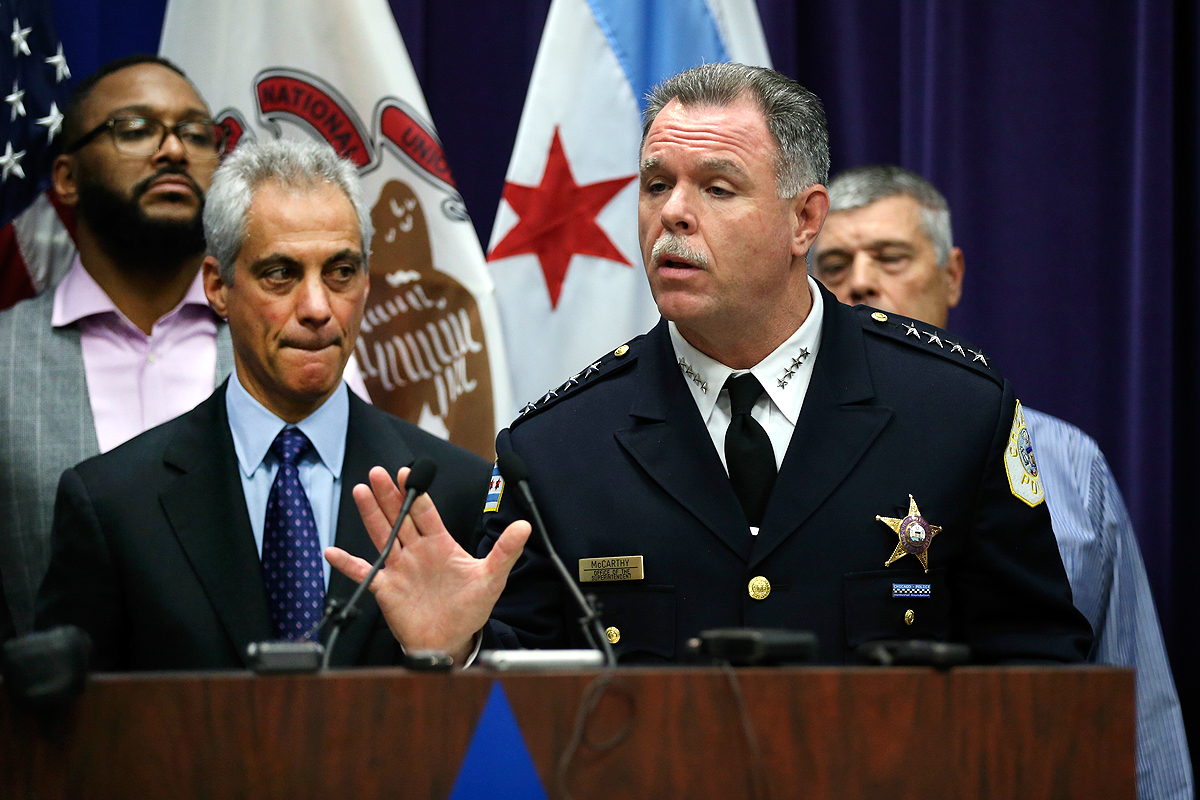Shortly before the release of the Laquan McDonald video, John Kass captured the fears of what could happen in its wake in a widely read column, "The Video That Might Rip Chicago Apart—and Why You Need to See It." It was also captured by Britt Julious, writing in Esquire today.
"Where is the rioting?" I heard a young white man with a beard ask another white man with a beard. The video had just been released 30 minutes earlier, the protests had barely begun. But he wasn't joking. There could only be rioting and nothing else. Grief and protest didn't exist.
The video hasn't ripped Chicago apart, which was reflected in a memorable CNN exchange:
HARRY HOUCK: I'm shocked there's no violence. I really am shocked.
BAKARI SELLERS: You don't have to be shocked.
It shouldn't be shocking. Chicago's activist community—led in this instance by the Black Youth Project, among others—is well-organized and experienced. Only a handful of arrests were reported. The most prominent among those arrested was the prominent young poet and organizer Malcolm London, and the charges against him were just dropped.
But even if the protests are over, the fallout from the video's release has just begun. The video’s shock is not just in the short, violent death of McDonald—a 17-year-old who seemed to have a chance despite having none in his childhood—but in its tremendous divergence from the official story that had emerged immediately after the shooting. That divergence was first noted by Jamie Kalven 10 months ago, who had been tipped off by an anonymous witness. Kalven had some advice for the city at the time:
The decision of whether or not to release the video ultimately rests with Mayor Rahm Emanuel, who is currently in the midst of a re-election campaign. His administration has taken several significant steps toward establishing a credible regime of police accountability. Among them is the transparency policy it adopted following a 2014 Illinois Appellate Court decision holding that documents relating to closed investigations of police misconduct are public information. It would be a logical extension of that policy to include open as well as closed cases, to the extent timely information can be made public without compromising ongoing investigations.
[snip]
The McDonald footage will come out, but a great deal turns on how it comes out. Will the city be forced to release it in a way that deepens the crisis of public confidence in law enforcement, or will it be released in a way that helps restore the "foundation of trust" between residents and police on which effective law enforcement depends? If the city resists releasing the video until legally compelled to do so, outrage at what it depicts will be compounded by outrage that the city knew its contents (and the autopsy results) in the immediate aftermath of the incident yet withheld that information from the public.
That didn't happen. It was forced out by the persistence of another independent journalist, Brandon Smith, who used the Freedom of Information Act to shake loose the video 400 days after it had documented McDonald's death; Smith has a piece in the Guardian about how and why his pursuit of the video happened. The video was released last night following a defensive, self-aggrandizing press conference that Chris Hayes called "bizarre" and Mark Konkol called "strange."
The mayor isolated officer Jason Van Dyke as a bad actor, but activists and journalists alike have been pressing the administration on systematic issues. Like the Tribune today:
Absent from remarks given by McCarthy and Emanuel on Tuesday afternoon was any acknowledgment of a systemic problem in the Police Department oversight procedures that the courts have found gives police officers a sense of impunity to break the law and violate citizens' rights.
And Steve Bogira in the Reader, who has a number of specific recommendations for reform:
The first thing the mayor needs to learn from McDonald's death is that holding one individual accountable isn't in any way sufficient. This shooting was especially "hideous," but Chicago has a systemic problem, which is that police officers who shoot someone unjustifiably can expect to get away with it.
And it's not just Chicagoans. Peter Moskos, the sociologist and former Baltimore police officer, writes that "the officer who killed McDonald fits the pattern of bad cops: high activity, drug work, too many complaints. Sure, all the complaints weren't justified, but some of them were. And undoubtedly he did a lot of bad shit that people didn't file formal complaints about." In the Sun-Times, Frank Main has the details on one of those complaints, which cost the city $350,000.
City Council's black caucus has renewed its call for police Superintendent Garry McCarthy to be fired and is pushing back against Anita Alvarez as well—she's facing a tough race against a former aide to Cook County Board President Toni Preckwinkle, and her handling of the McDonald video and the charges against Dante Servin, the officer who shot Rekia Boyd in 2012, are certain to be top issues.
Chicago has not been ripped apart by the release of the video. Instead, there's a growing consensus among activists, journalists, and some politicians that Chicago's top leadership is particularly vulnerable right now and in dire need of taking concrete action. Nor is it mere anger and criticism; there are an endless number of concrete suggestions out there.
Yesterday the mayor, police chief, and state's attorney called for calm from the city. And to a degree that astonished some, they got it. Time will tell if its citizens get what they want in return.



